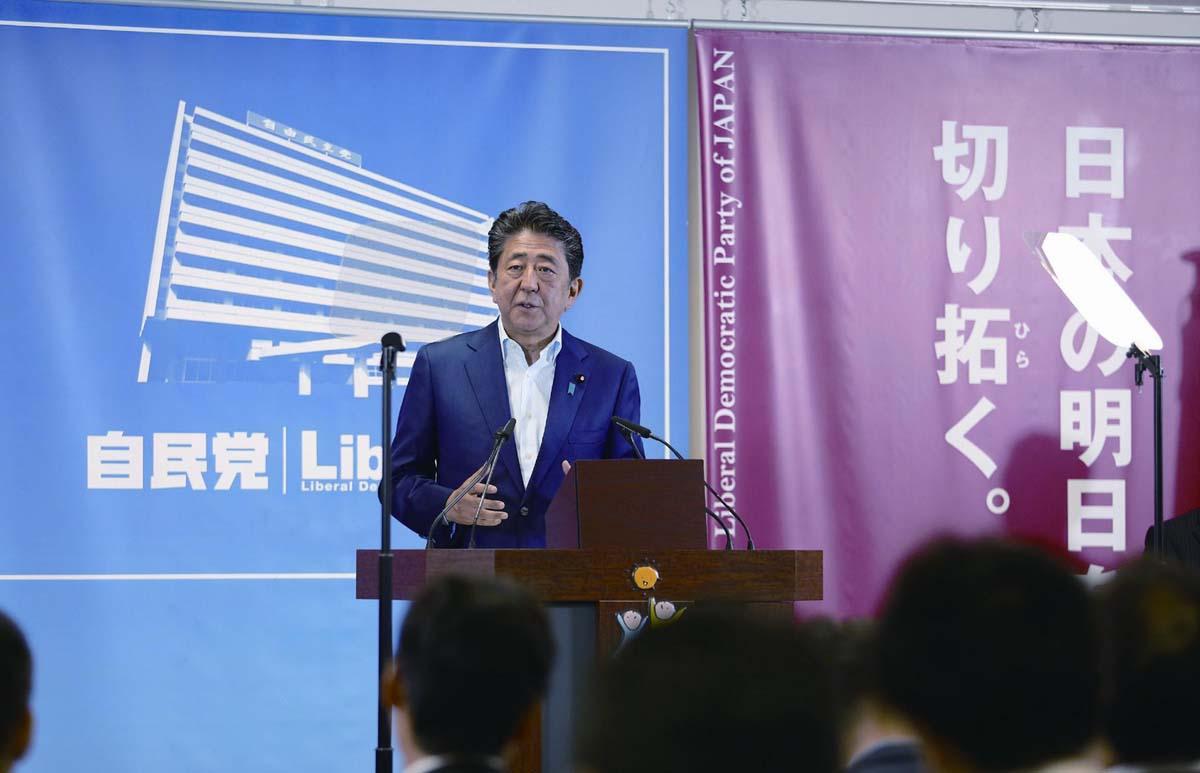Thwarted Ambition
2019-09-10ByZhouYongsheng
By Zhou Yongsheng

The ruling Japanese Liberal Democratic Party (LDP) and its junior partner the Komeito Party won 71 of the 124 seats in the House of Councilors election held on July 21, falling short of the two-thir ds majority it needed in the 245-seat upper house of the National Diet to revise the nations constitution.
Japanese Prime Minister Shinzo Abes proposal would add a clause to Article 9 of the Constitution legalizing Japans SelfDefense Forces. Political parties in support of the revision, including the LDP, the Komeito and reformist parties, hold 160 seats, four short of the 164-seat minimum necessary to propose revisions to the constitution. That means the Abe administration will not be able to rely on its current political bloc to advance its constitutional revision.
Voter turnout dropped by 5 percent for the national election, indicating that in the current “low-desire society” in Japan, peoples interest in politics is gradually declining. However, votes for the LDP did not decrease sharply and votes for Komeito actually increased, which can be viewed as voter approval for Abes administration over the past six years. Yet voters also showed rationality and expressed reservations about the constitutional reform promoted by Abe, evidenced by his failure to win a supermajority.
Abe will continue to pursue the revision of Japans pacifist constitution. How he will further this goal and whether he can achieve it are a matter of great concern to East Asian countries as well as the international community.
Forcing a supermajority
For now, the LDP and its political partners hold over two thirds of the seats in the House of Representatives, the lower house of the Diet, that can pave the way for proposing the revision to the constitution. But the real problem lies in the lack of such a majority in the upper house.
The LDP could possibly lure other small parties to its camp, like the Democratic Party for the People (DPP), which won 21 seats. Currently, the DPP does not support the administrations constitutional revision, but the party is divided. A considerable number of its members agree with the LDP and Komeito, however, some forces are against the revision, and their opposition poses a huge obstacle to a union with the ruling bloc. Nevertheless, the party may be persuaded to change its stance and support the constitutional revision. If it does, along with the support of the Japan Restoration Party, which won 13 seats, the revision forces will have a supermajority in the House of Councilors and can comfortably propose the revision.
Japan will take the initiative to control its adverse policy toward China to maintain the momentum in enhanced bilateral ties
This will not be realized quickly, however; long-term negotiations and consultations among the four parties will be required. It needs the ruling bloc to make compromises or even concessions on certain policies to win support. Moreover, the Abe administration may even reshuffl e its cabinet to include members of other parties to buy their approval for the constitutional reform.
In addition to a two-thirds majority in both houses, a majority in a public referendum is also required to make revisions to the Japanese Constitution, according to current law. Japanese people have the final say on this issue and for now, the ratio of those against the revision is still higher than 51 percent. The ruling bloc and other minor parties have to win more approval from the public through propaganda or other measures, which wont be easy.
Negative influence
Japans revision of its constitution will produce a negative global influence. Since World War II, Japan has focused on economic growth and has won worldwide approval by observing its pacifi st constitution.
Abes constitutional revision could lead the way for Japan to move toward strengthening its armaments supply and establishing a national defense army, which may be followed by a pursuit of military power. This could also mean that in the future, Japan will attempt to get more involved in Asia-Pacifi c and international military affairs.
This prospect has changed Asian countries perception of Japan. Instead of provoking forgiveness of Japans crimes during WWII, Japans revision of its constitution will make the continent more alert and suspicious of Japans policies and value orientation.

It is very possible that it will follow the U.S. military closer and use its military power imprudently. If this is the case, Japan will become another unstable factor that could disturb the Asia-Pacifi c region and the entire world. Along with the U.S. military, Japans Self-Defense Forces could also show up in areas haunted by confl ict and turbulence.
Future policy
To win public support for his constitutional move, Abe may adjust parts of his domestic and foreign policies during his term.
In the domestic arena, Abenomics will be further pursued, with the pace for raising the consumption tax and implementing it in October rushed, even though the disapproval rating for this issue is still higher than 55 percent. Meanwhile, Abe will promote free education from kindergarten to university, which will win support from a considerable number of people. The prime minister will also gradually raise pensions and salaries, which are critical to him and his ruling bloc to maintain a high approval rating.
In foreign policy, the Abe administration will continue to consolidate its close alli- ance with the U.S. And in order to reach a bilateral free trade deal with the U.S., Japan is likely to make substantial concessions and basically satisfy all U.S. demands in trade negotiations. However, the Japanese ruling class has found it hard to predict U.S. policy under President Donald Trumps fl ipfl ops, which have actually started to alienate the traditional ally. That may prompt the Abe administration to implement a more independent policy to reduce its reliance on the U.S., especially in military and defense areas. Japan may take a more autonomous military stance and increase defense against the Democratic Peoples Republic of Korea, Russia and China.
The administration may stop investing energy in improving bilateral ties with Russia since its neighbor has made it clear that it will not return two islands off Hokkaido to Japan, refusing to even negotiate on the issue. Russias stance means that Abes arduous diplomatic efforts to regain Southern Kuriles from Russia over the past few years have failed. Since Abe seemingly lost enthusiasm and passion, there will be no breakthroughs in Japan-Russia ties in the short or medium term.
As for its relations with the Republic of Korea (ROK), tensions are still high, with no signs of a thaw. Japan may tighten sanctions against the ROK and bilateral ties may continue to slide.
The Abe administration will make more efforts to improve ties with China to pave the way for Chinese President Xi Jinpings planned visit next spring. But this overture does not mean Japan will ease its containment and vigilance against China. Japan will continue to adopt a preventive policy toward China, make military preparations and try to contain China in the East China Sea and South China Sea, and this may all be done under different pretexts.
However, Japan will take the initiative to control its adverse policy toward China to maintain the momentum in enhanced bilateral ties. Improving ties with China will win points for the Abe administration, thus, it will make the utmost effort to progress in order to get voter approval. But Abe and his administration have long been weary of Chinas system and future development; therefore, it will be diffi cult to restore bilateral ties wholeheartedly on Japans part.
